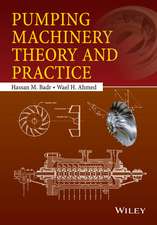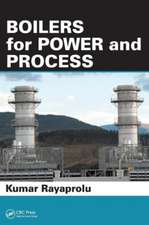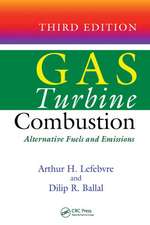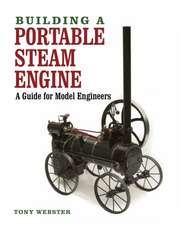Free Surface Flows under Compensated Gravity Conditions: Springer Tracts in Modern Physics, cartea 221
Autor Michael Dreyeren Limba Engleză Hardback – 6 noi 2006
| Toate formatele și edițiile | Preț | Express |
|---|---|---|
| Paperback (1) | 1216.16 lei 6-8 săpt. | |
| Springer Berlin, Heidelberg – 30 oct 2014 | 1216.16 lei 6-8 săpt. | |
| Hardback (1) | 1223.11 lei 6-8 săpt. | |
| Springer Berlin, Heidelberg – 6 noi 2006 | 1223.11 lei 6-8 săpt. |
Din seria Springer Tracts in Modern Physics
- 15%
 Preț: 648.42 lei
Preț: 648.42 lei - 18%
 Preț: 887.38 lei
Preț: 887.38 lei - 18%
 Preț: 1127.60 lei
Preț: 1127.60 lei - 20%
 Preț: 814.70 lei
Preț: 814.70 lei - 20%
 Preț: 816.04 lei
Preț: 816.04 lei - 18%
 Preț: 1424.83 lei
Preț: 1424.83 lei - 18%
 Preț: 785.55 lei
Preț: 785.55 lei -
 Preț: 409.63 lei
Preț: 409.63 lei -
 Preț: 428.30 lei
Preț: 428.30 lei -
 Preț: 426.34 lei
Preț: 426.34 lei -
 Preț: 387.38 lei
Preț: 387.38 lei -
 Preț: 387.20 lei
Preț: 387.20 lei -
 Preț: 381.21 lei
Preț: 381.21 lei -
 Preț: 378.71 lei
Preț: 378.71 lei -
 Preț: 382.95 lei
Preț: 382.95 lei -
 Preț: 384.48 lei
Preț: 384.48 lei -
 Preț: 382.36 lei
Preț: 382.36 lei -
 Preț: 387.38 lei
Preț: 387.38 lei -
 Preț: 391.40 lei
Preț: 391.40 lei -
 Preț: 380.63 lei
Preț: 380.63 lei -
 Preț: 386.00 lei
Preț: 386.00 lei - 18%
 Preț: 884.07 lei
Preț: 884.07 lei -
 Preț: 386.00 lei
Preț: 386.00 lei -
 Preț: 385.25 lei
Preț: 385.25 lei -
 Preț: 383.71 lei
Preț: 383.71 lei -
 Preț: 377.95 lei
Preț: 377.95 lei -
 Preț: 377.18 lei
Preț: 377.18 lei -
 Preț: 377.95 lei
Preț: 377.95 lei -
 Preț: 384.70 lei
Preț: 384.70 lei -
 Preț: 381.98 lei
Preț: 381.98 lei -
 Preț: 391.61 lei
Preț: 391.61 lei -
 Preț: 379.68 lei
Preț: 379.68 lei -
 Preț: 384.70 lei
Preț: 384.70 lei -
 Preț: 391.40 lei
Preț: 391.40 lei -
 Preț: 378.92 lei
Preț: 378.92 lei -
 Preț: 380.25 lei
Preț: 380.25 lei -
 Preț: 377.35 lei
Preț: 377.35 lei -
 Preț: 382.57 lei
Preț: 382.57 lei -
 Preț: 384.31 lei
Preț: 384.31 lei -
 Preț: 381.21 lei
Preț: 381.21 lei -
 Preț: 387.96 lei
Preț: 387.96 lei -
 Preț: 381.43 lei
Preț: 381.43 lei -
 Preț: 384.48 lei
Preț: 384.48 lei -
 Preț: 386.22 lei
Preț: 386.22 lei - 18%
 Preț: 1224.99 lei
Preț: 1224.99 lei
Preț: 1223.11 lei
Preț vechi: 1491.60 lei
-18% Nou
Puncte Express: 1835
Preț estimativ în valută:
234.07€ • 243.47$ • 193.24£
234.07€ • 243.47$ • 193.24£
Carte tipărită la comandă
Livrare economică 15-29 aprilie
Preluare comenzi: 021 569.72.76
Specificații
ISBN-13: 9783540446262
ISBN-10: 3540446265
Pagini: 284
Ilustrații: X, 270 p.
Dimensiuni: 155 x 235 x 22 mm
Greutate: 0.6 kg
Ediția:2007
Editura: Springer Berlin, Heidelberg
Colecția Springer
Seria Springer Tracts in Modern Physics
Locul publicării:Berlin, Heidelberg, Germany
ISBN-10: 3540446265
Pagini: 284
Ilustrații: X, 270 p.
Dimensiuni: 155 x 235 x 22 mm
Greutate: 0.6 kg
Ediția:2007
Editura: Springer Berlin, Heidelberg
Colecția Springer
Seria Springer Tracts in Modern Physics
Locul publicării:Berlin, Heidelberg, Germany
Public țintă
ResearchCuprins
State of the Art.- Basic Equations and Dimensionless Numbers.- Orders of Magnitude of the Dimensionless Numbers.- Literature Review.- Surface Oscillations upon Step Reduction of the Bond Number.- Static Surface Shapes.- Scaling of the Dynamic Behavior.- Experiments on Surface Oscillations.- Numerical Calculations.- Conclusions.- Capillary Rise in Cylindrical Tubes.- Experiments on Capillary Rise.- Mathematical Model for the Capillary Rise.- Results and Discussion.- Summary.- Critical Velocities in Open Capillary Channel Flows.- and Background.- Mathematical Model for the Flow Between Parallel Plates.- Experimental Results.- Results and Discussion.- Perspectives.- Conclusion.- Future Projects.- Entrance Flow Problems.
Recenzii
From the reviews:
"The research work of the author and his colleagues at the Center of Applied Space Technology and Microgravity, University of Bremen, considers the behavior of fluids in a low-gravity environment with special emphasis on application in PMD (propellant management device) systems. … The experimental results are presented for a wide range of parameters, and a one-dimensional theory is corroborated by the experiments. … It is very well written research monograph, which should be of considerable value to the scientists working in this field." (Jagdish Prakash, Zentralblatt MATH, Vol. 1115 (17), 2007)
"A compendium that would be particularly helpful to a person new to the field. … An attractive feature of the book is the inclusion of summaries … . The book should be of interest to specialists in fluid management systems design for low gravity. … For the nonspecialist the book gives a good glimpse into how results from experiments, analysis, and computation can combine to provide information and insight into low-gravity fluid flow, on which engineering designs can be based." (Paul Concus, SIAM Review, Vol. 50 (1), 2008)
"The research work of the author and his colleagues at the Center of Applied Space Technology and Microgravity, University of Bremen, considers the behavior of fluids in a low-gravity environment with special emphasis on application in PMD (propellant management device) systems. … The experimental results are presented for a wide range of parameters, and a one-dimensional theory is corroborated by the experiments. … It is very well written research monograph, which should be of considerable value to the scientists working in this field." (Jagdish Prakash, Zentralblatt MATH, Vol. 1115 (17), 2007)
"A compendium that would be particularly helpful to a person new to the field. … An attractive feature of the book is the inclusion of summaries … . The book should be of interest to specialists in fluid management systems design for low gravity. … For the nonspecialist the book gives a good glimpse into how results from experiments, analysis, and computation can combine to provide information and insight into low-gravity fluid flow, on which engineering designs can be based." (Paul Concus, SIAM Review, Vol. 50 (1), 2008)
Textul de pe ultima copertă
This book considers the behavior of fluids in a low-gravity environment with special emphasis on application in PMD (propellant management device) systems . In the compensated gravity environment of a spacecraft, the hydrostatic pressure decreases to very low values depending on the residual acceleration, and surface tension forces become dominant. Consequently, surface tension can be used to transport and position liquids if the residual acceleration and the resulting hydrostatic pressure are small compared to the capillary pressure. One prominent application is the use of PMDs in surface-tension satellite tanks. PMDs must ensure that the tank outlet is covered with liquid whenever outflow is demanded. Furthermore, PMDs are used to ensure expulsion and refilling of tanks for liquids and gases for life support, reactants, and experiment supplies. Since most of the PMD designs are not testable on ground and thus rely on analytical or numerical concepts, this book treats three different flow problems with analytical, numerical and experimental means: the transient contour change between two static surface configurations (free surface oscillations), the capillary rise in tubes (capillary rise), and the flow through open capillary channels (choking). These problems are linked together by the same set of equations and boundary conditions which are necessary to model the fluid behavior, and by the same set of characteristic numbers.
Caracteristici
Up-to-date review











